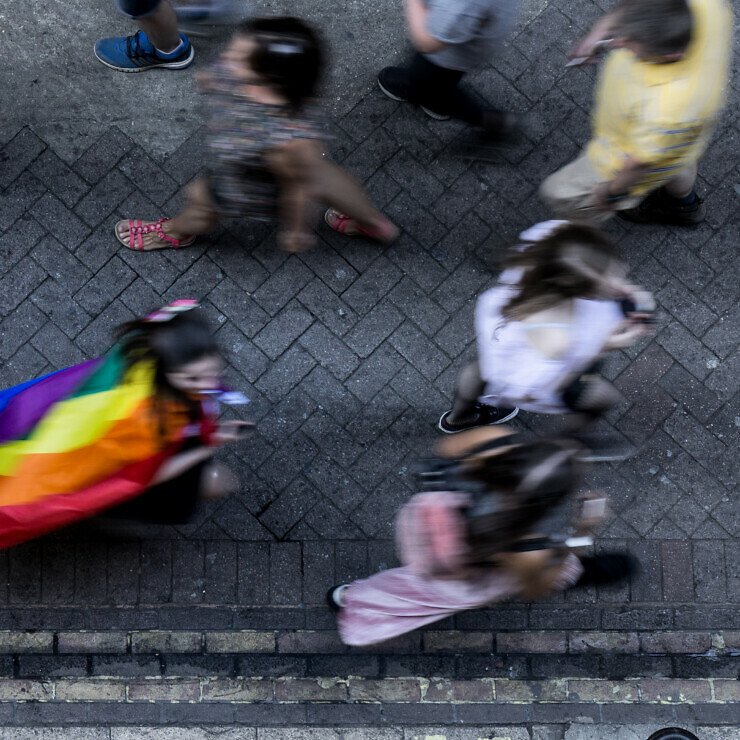Photo courtesy of Ryan Prince via Flickr.
By Jendayi Leben-Martin ’24
Managing Editor of Content and Global Editor
Violence against gender-nonconforming people has led to new bloodshed in Iraq. According to CNN, on Sept. 25, 2023, Tiktok influencer Noor Alsaffar, who went by the social media name “Noor BM,” was fatally shot. The shooter has not been publicly confirmed.
Gay Times reported that Alsaffar was well-known online for posting fashion and beauty content and had over 370,000 followers between TikTok and Instagram. Alsaffar’s social media accounts were inundated with comments following their death, both from those mourning their loss and those celebrating their murder, according to CNN.
Few details have been released about Alsaffar’s death, and a source from Iraqi security has told CNN that there is an ongoing, open investigation. The source maintained that they are not authorized to speak about the case to the media.
Similarly, Khaled Almena, a representative for the Iraqi police, told CNN that the shooting was a “criminal incident” and that he would make further comment at a “later time.”
Alsaffar, who identified solely as a “crossdresser and a model” when interviewed on Al Walaa’s Youtube channel in 2020, stated that they did not identify themselves as gay or transgender, Gay Times reported. However, according to CNN, IraQueer, an Iraqi LGBTQ+ advocacy group, used hashtags “#transphobia” and “#murderoftranspeople” in Instagram posts memorializing Alsaffar’s life and impact.
According to Gay Times, a Human Rights Report found that Alsaffar was only one of many people aligned with the queer community being targeted on social media across the Middle East and North Africa. The outlet further reported that instances of such harassment have increased in lieu of physical attacks on LGBTQ+ people in the streets.
Alsaffar’s death coincides with the Iraqi government’s growing oppression of LGBTQ+ expression and comes only a few months after continued efforts to criminalize homosexuality, CBS reported. In August 2023, Iraq’s Media and Communications Commission required that all social and other media platforms stop using terms like “homosexuality” and “homosexual” in their content. The term “sexual deviancy” has been chosen to replace any mentions of homosexuality.
CBS reported that this decision was primarily reported by government and private news platforms and has been justified as an attempt at preserving “societal values and public order.” No penalties have been written yet for not acting in accordance with these guidelines, but a representative from the Iraqi government has claimed that fines could be a possibility for not following the Media and Communication Commission's guidelines.
While the penal code of Iraq does not directly criminalize homosexuality, Iraq’s judiciary system often finds ways to penalize homosexual activity and expressions. For example, it often claims to use the protection of “public morals,” which are written into law, as a justification for such prosecutions. The ambiguity of these laws has allowed for homosexuality, which has not been explicitly declared illegal, to be indirectly criminalized.
A proposed bill that does directly outlaw homosexuality was submitted to Iraq’s Speaker of Parliament by Mortada Al-Saadi, the deputy head of the Committee on Legal Affairs in the Iraqi federal parliament, in July 2023, Gay Times reported.
Despite the progression of anti-LGBTQ+ legislation, there have been calls by activists to stop the spread of violence against queer people in Iraq. Rasha Younes, senior LGBT rights researcher at Human Rights Watch told the think tank that “Iraq’s proposed anti-LGBT law would threaten the lives of Iraqis already facing a hostile environment for LGBT people.”
Younes also stated that “Iraqi lawmakers are sending an appalling message to LGBT people that their speech is criminal and their lives are expendable.” The researcher claimed that this idea feeds directly into the attacks that queer people in Iraq face, both online and in person.
When asked about the reason for such a progression of anti-LGBTQ+ legal efforts, Dr. Sohail Hashmi, professor of politics and international relations and chair of the international relations department at Mount Holyoke College, said that “in Muslim societies, traditionally, issues around sexuality have been generally treated as a private matter. They were not subject to government enforcement, so to speak.”
He continued by explaining that, while he “[is] not going to pretend that there's been a record of tolerance on a very public level … now we've seen the development of these kinds of laws as a way for weak governments to centralize power. So it's an attempt to build a nation-state.”
Dr. Hashmi also explained that such tactics of using the law to gain control over marginalized groups are not a new practice. Many marginalized groups, “whether they're ethnic or sexual, [or] whether they're women … [have] felt the brunt of it.”
Commenting on how unique the Iraqi government’s relationship with LGBTQ+ rights is, Dr. Hashmi stated that “this is nothing new. We've seen this in many, many countries around the Muslim world.”

